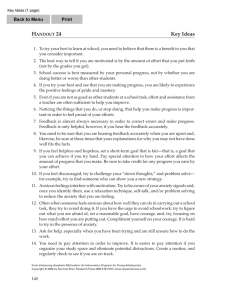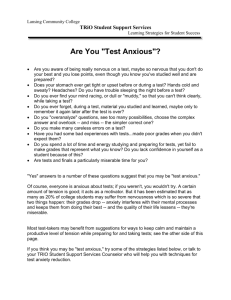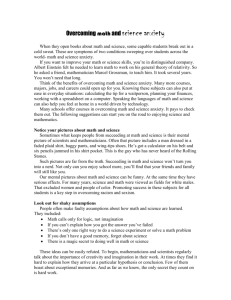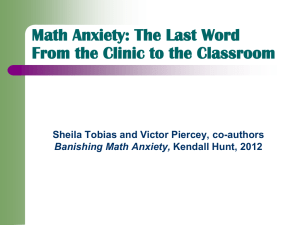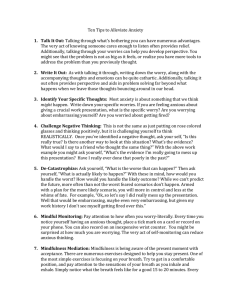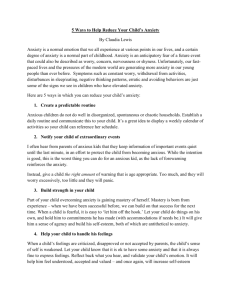Managing Test Anxiety - Tacoma Community College
advertisement
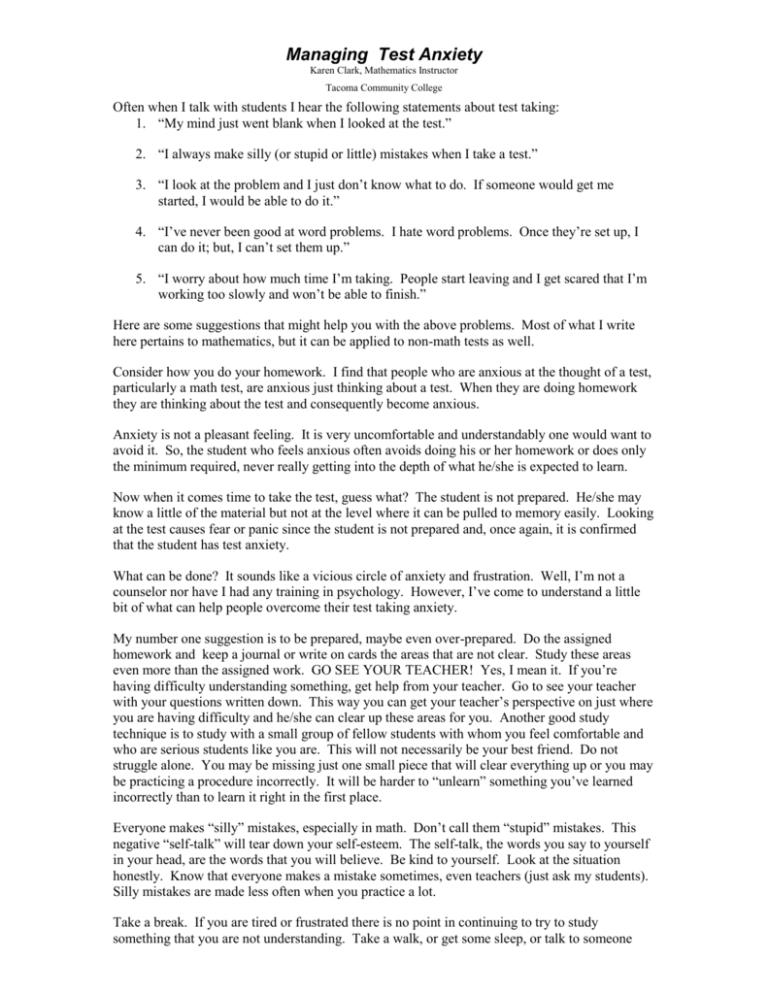
Managing Test Anxiety Karen Clark, Mathematics Instructor Tacoma Community College Often when I talk with students I hear the following statements about test taking: 1. “My mind just went blank when I looked at the test.” 2. “I always make silly (or stupid or little) mistakes when I take a test.” 3. “I look at the problem and I just don’t know what to do. If someone would get me started, I would be able to do it.” 4. “I’ve never been good at word problems. I hate word problems. Once they’re set up, I can do it; but, I can’t set them up.” 5. “I worry about how much time I’m taking. People start leaving and I get scared that I’m working too slowly and won’t be able to finish.” Here are some suggestions that might help you with the above problems. Most of what I write here pertains to mathematics, but it can be applied to non-math tests as well. Consider how you do your homework. I find that people who are anxious at the thought of a test, particularly a math test, are anxious just thinking about a test. When they are doing homework they are thinking about the test and consequently become anxious. Anxiety is not a pleasant feeling. It is very uncomfortable and understandably one would want to avoid it. So, the student who feels anxious often avoids doing his or her homework or does only the minimum required, never really getting into the depth of what he/she is expected to learn. Now when it comes time to take the test, guess what? The student is not prepared. He/she may know a little of the material but not at the level where it can be pulled to memory easily. Looking at the test causes fear or panic since the student is not prepared and, once again, it is confirmed that the student has test anxiety. What can be done? It sounds like a vicious circle of anxiety and frustration. Well, I’m not a counselor nor have I had any training in psychology. However, I’ve come to understand a little bit of what can help people overcome their test taking anxiety. My number one suggestion is to be prepared, maybe even over-prepared. Do the assigned homework and keep a journal or write on cards the areas that are not clear. Study these areas even more than the assigned work. GO SEE YOUR TEACHER! Yes, I mean it. If you’re having difficulty understanding something, get help from your teacher. Go to see your teacher with your questions written down. This way you can get your teacher’s perspective on just where you are having difficulty and he/she can clear up these areas for you. Another good study technique is to study with a small group of fellow students with whom you feel comfortable and who are serious students like you are. This will not necessarily be your best friend. Do not struggle alone. You may be missing just one small piece that will clear everything up or you may be practicing a procedure incorrectly. It will be harder to “unlearn” something you’ve learned incorrectly than to learn it right in the first place. Everyone makes “silly” mistakes, especially in math. Don’t call them “stupid” mistakes. This negative “self-talk” will tear down your self-esteem. The self-talk, the words you say to yourself in your head, are the words that you will believe. Be kind to yourself. Look at the situation honestly. Know that everyone makes a mistake sometimes, even teachers (just ask my students). Silly mistakes are made less often when you practice a lot. Take a break. If you are tired or frustrated there is no point in continuing to try to study something that you are not understanding. Take a walk, or get some sleep, or talk to someone about something other than your homework. When you do go back to it fresh, you will see things you were unable to see before. You can’t force learning. It will happen in time. Mix up the problems you are studying in preparing to take a test. If you look at an example and practice ten problems like the example, you’re not learning very much. Pay close attention to the directions: simplify, factor, evaluate, solve . . . these are math directions with very specific meanings. Often when students do their homework, they do not pay close attention to the directions. Though they can do various procedures, they do not know what these procedures are called and when asked to do them on a test, they don’t know what to do. Mix up your problems. I like the idea of a “problem basket.” When you do your homework, write some of the problems along with directions on an index card. Put only one problem on a card; be sure to write the directions, too. Put the solution to the problem on the back of the card. Put this card in a basket. When it is time for a test, you have lots of practice problems to do. Pull them out of your basket one at a time, read the directions and the problem. This will force you to pay close attention to the directions. Work the problem and check your work with the solution on the back of the card. What about word problems? There are specific techniques for solving word problems. Reading the problem many times is always necessary. Pull it apart, cross out the words that are superfluous, circle key phrases, and the very first thing: Look for the question. What are you being asked to find? If you don’t know, you can’t possibly solve it. Draw pictures, make charts, write down what you know and what you are trying to find. Be very organized. If your teacher has a specific way he/she wants you to do the word problems, follow that procedure. Your teacher is trying to help you. Because word problems are so difficult for students, they often avoid doing them. You should spend most of your study time on the word problems. That is where the real mathematics is. You may be interested in purchasing a little book called How to Solve Word Problems in Algebra, ISBN: 0-07-032620-7, by Mildred Johnson. It has very stepby-step ways to approach most traditional algebra word problems. (It is available in the TCC bookstore.) What about the time you spend on taking a test? Well, there is something I always tell students: “Use all your resources.” Whether it is a textbook, a person, your teacher, good equipment, or time. Use your resources to help you get where you want to go. When you are taking a test, use all the time you have. If you finish early, check your work. If students start to leave early and you’re not close to finished, so what? You don’t know why they are leaving. Maybe they didn’t know any of the test material and are turning in a blank paper. Don’t assume that just because someone is leaving before you that that person knows more than you or has done better on the test than you have. You are using your resource of all the time you have available to take the test. If you start talking to yourself (that self-talk again) about how you’re too slow, you are using precious time in a way that is not helping you with the task at hand, doing well on your test. Don’t waste your time clock–watching. This, too, takes away from your time resource. If necessary, turn your chair with your back to the clock. There are lots of other test-taking techniques: Look through the entire test, do the easy problems first, don’t waste time on a problem that has you stumped—leave it and come back to it if you have time. Get a good night’s sleep before the test. If you study everyday, you will not need to cram—it doesn’t work anyway. If you have a severe case of test anxiety, you may want to talk to a counselor about it. Here at TCC we have counselors available in Building 18. Appointments are necessary – go to the Counseling/Advising center to make an appointment. Relaxation techniques also can be helpful. You might consider getting a tape or CD of relaxation exercises. You will need to listen to the tapes several times for them to be helpful. Plan ahead. Everyone experiences a certain amount of anxiety when faced with a test. A little anxiety is good. It keeps us sharp and focused.
